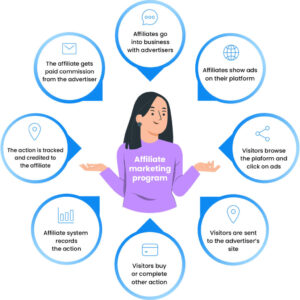 Affiliate marketing is a powerful strategy in the digital world that enables businesses to expand their reach and boost sales through a network of partners. It’s a performance-based marketing model where affiliates earn commissions for driving traffic or sales to a company’s products or services. This model benefits both the businesses and the affiliates, creating a win-win scenario in the online marketplace.
Affiliate marketing is a powerful strategy in the digital world that enables businesses to expand their reach and boost sales through a network of partners. It’s a performance-based marketing model where affiliates earn commissions for driving traffic or sales to a company’s products or services. This model benefits both the businesses and the affiliates, creating a win-win scenario in the online marketplace.
 1. Understanding Affiliate Marketing
1. Understanding Affiliate Marketing
Affiliate marketing involves three key players:
1. Merchant (or Advertiser): The business or individual that creates the product or service. Merchants can range from large corporations to small entrepreneurs.
b: The individual or entity that promotes the merchant’s product. Affiliates use various channels, such as blogs, social media, or websites, to drive traffic to the merchant’s site.
3. Consumer: The end-user who interacts with the affiliate’s promotional content and makes a purchase or completes an action, leading to a commission for the affiliate.
 2. How Affiliate Marketing Works
2. How Affiliate Marketing Works
The affiliate marketing process typically involves the following steps:
1. Affiliate Joins Program: Affiliates sign up for an affiliate program offered by merchants. These programs can be managed in-house by the merchant or through affiliate networks.
2. Promotional Content Creation: Affiliates receive unique tracking links or codes to use in their content. They create promotional material such as reviews, articles, or social media posts that include these links.
3. Consumer Clicks on Link: A consumer clicks on the affiliate’s tracking link and is redirected to the merchant’s site.
4. Action is Tracked: The affiliate’s link includes a cookie that tracks the consumer’s actions on the merchant’s site, such as purchases or sign-ups.
5. Commission Earned: If the consumer completes a desired action (like making a purchase), the affiliate earns a commission based on the agreed terms.
 3. Types of Affiliate Marketing
3. Types of Affiliate Marketing
Affiliate marketing encompasses several types, each with its own unique approach:
1. Pay-Per-Sale (PPS): Affiliates earn a commission when a consumer makes a purchase through their affiliate link. This is the most common type of affiliate marketing.
2. Pay-Per-Click (PPC): Affiliates earn money based on the number of clicks generated through their affiliate links, regardless of whether the consumer makes a purchase.
3. Pay-Per-Lead (PPL): Affiliates earn a commission when a consumer takes a specific action, such as signing up for a newsletter or filling out a form.
4. Cost-Per-Acquisition (CPA): Affiliates are paid when a consumer performs a particular action, like signing up for a free trial or completing a survey.
 4. Benefits of Affiliate Marketing
4. Benefits of Affiliate Marketing
For Merchants:
1. Cost-Effective: Merchants only pay for actual sales or leads generated, making it a low-risk investment.
2. Extended Reach: Affiliates can help merchants reach new audiences and markets without significant marketing expenditures.
3. Performance-Based: Merchants can measure the effectiveness of their affiliate program and adjust strategies based on performance data.
For Affiliates:
1. Low Entry Barrier: Affiliates can start marketing with minimal upfront investment, using existing platforms like blogs or social media.
2. Flexibility: Affiliates can choose products or services to promote based on their niche or interests and work on their own schedule.
3. Passive Income Potential: Successful affiliates can earn commissions from their content long after it has been published.
5. How to Start Affiliate Marketing
1. Choose a Niche: Identify a niche that aligns with your interests and expertise. This will help you create content that resonates with your audience.
2. Research Affiliate Programs: Look for reputable affiliate programs or networks that offer products or services relevant to your niche. Popular networks include Amazon Associates, ShareASale, and Commission Junction.
3. Create High-Quality Content: Develop engaging and valuable content that attracts your target audience. This could include blog posts, videos, or social media updates.
4. Promote Your Affiliate Links: Integrate your affiliate links into your content in a natural and persuasive way. Ensure that your promotions are ethical and transparent.
bUse analytics tools to monitor the performance of your affiliate links. This will help you understand what works and optimize your strategies accordingly.
6. Challenges in Affiliate Marketing
While affiliate marketing offers numerous benefits, it also comes with its own set of challenges:
1. High Competition: Many niches are highly competitive, making it difficult for new affiliates to stand out.
2. Income Variability: Affiliate income can be unpredictable, especially for beginners. It may take time to build a steady stream of commissions.
3. Compliance Issues: Affiliates must adhere to legal and ethical standards, such as disclosing affiliate relationships to their audience.
4. Dependence on Merchant: Affiliates rely on merchants to maintain product quality and ensure timely payments. Any issues on the merchant’s end can affect the affiliate’s earnings.
7. Best Practices for Success
1. Build Trust: Establish credibility with your audience by providing honest reviews and useful information. Trust can significantly impact conversion rates.
2. Focus on Quality: Create high-quality content that offers real value to your audience. Quality content is more likely to drive conversions.
3. Optimize for SEO: Utilize search engine optimization techniques to improve your content’s visibility and attract organic traffic.
4. Stay Updated: Keep abreast of industry trends and changes in affiliate marketing practices. Staying informed helps you adapt and remain competitive.
5. Test and Refine: Continuously test different strategies and refine your approach based on performance data. This iterative process helps in optimizing results.
8. Future Trends in Affiliate Marketing
As technology and consumer behavior evolve, affiliate marketing is likely to see several trends:
1. Influencer Partnerships: Collaborations with influencers are expected to grow, leveraging their reach and credibility to drive sales.
2. AI and Automation: Tools and platforms powered by artificial intelligence will enhance affiliate marketing by providing better data analysis and automation features.
3. Mobile Optimization: With the rise of mobile commerce, optimizing affiliate marketing strategies for mobile users will become increasingly important.
4. Personalization: Tailoring content and offers to individual preferences and behaviors will improve engagement and conversion rates.
Conclusion
Affiliate marketing is a dynamic and lucrative field that benefits both businesses and marketers. By understanding the fundamentals, leveraging best practices, and staying updated on industry trends, affiliates can build successful ventures and contribute to the growth of their partner merchants. Whether you’re a business looking to expand your reach or an aspiring affiliate marketer, embracing the principles of affiliate marketing can pave the way for substantial success in the digital age.



